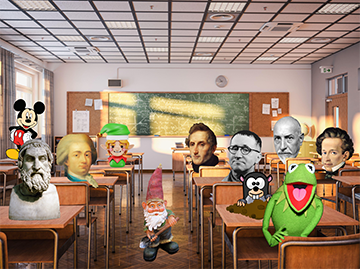For his debut directing a production for the Piccolo, Roberto Latini has chosen Il Teatro Comico because “in the mid 1700s - he explains - Goldoni wrote a play which addressed the subject of theatre. It almost smacks of Pirandello, two centuries earlier. It is not theatre within theatre, it is the conscience of theatre”.
-
Teatro Grassi
“This, which I have entitled Il Teatro Comico (Comical Theatre), rather than a comedy, can be considered a preface to my plays”. Thus, Carlo Goldoni addressed his readers in the preface to the printed edition of the theatrical text which represented a turning point for his entire work.
For his debut directing a production for the Piccolo, Roberto Latini has chosen Il Teatro Comico because “in the mid-1700s - he explains - Goldoni wrote a play which addressed the subject of theatre. It is something that smacks of Pirandello, almost two centuries earlier, it seems to have a sense of the twentieth century and its capacity to reflect upon itself, from Artaud onwards, passing by Pirandello, Beckett, Pinter, Ionesco, Müller... it is not theatre within theatre, it is the conscience of theatre”.
It is 1750, Goldoni is forty-three and wants to move away from the stereotypes of the Commedia dell’Arte to explore new territory. He wants his audiences to join him in this adventure, destined - and he was not wrong - to lay the foundations of modern theatre. With Teatro Comico he brought into play the astuteness of theatre to present the changes that he had in mind by having his actors recite them: in a theatre, a company is rehearsing the farce Il padre rivale del figlio; the masks are there - Pantalone, Brighella, the Doctor, Harlequin - the actors playing the lovers; there is the company head, Orazio, who is trying to convince them to abandon the tradition of improvisation and learn to study, to “think” and support a character, taking a written script as a starting point. “Goldoni demolished and reformed Italian theatre, and he had the sensibility to do so through a mechanism, a machine, intrinsic to theatre itself - continues Latini -. There are classics which I feel should be explored with contemporary eyes. There are stagings of classics which have in turn become national cultural treasures. To have at the Piccolo in the same season Strehler’s Harlequin and Il Teatro Comico could be a way to add something to the playwright to took from the past in order to move forward, who started a revolution from within the very mechanism of theatre”.
Duration: two hours and 30 minutes with interval
Learn more
Booklet
Read“This, which I have entitled Il Teatro Comico (Comical Theatre), rather than a comedy, can be considered a preface to my plays”. Thus, Carlo Goldoni addressed his readers in the preface to the printed edition of the theatrical text which represented a turning point for his entire work.
For his debut directing a production for the Piccolo, Roberto Latini has chosen Il Teatro Comico because “in the mid-1700s - he explains - Goldoni wrote a play which addressed the subject of theatre. It is something that smacks of Pirandello, almost two centuries earlier, it seems to have a sense of the twentieth century and its capacity to reflect upon itself, from Artaud onwards, passing by Pirandello, Beckett, Pinter, Ionesco, Müller... it is not theatre within theatre, it is the conscience of theatre”.
It is 1750, Goldoni is forty-three and wants to move away from the stereotypes of the Commedia dell’Arte to explore new territory. He wants his audiences to join him in this adventure, destined - and he was not wrong - to lay the foundations of modern theatre. With Teatro Comico he brought into play the astuteness of theatre to present the changes that he had in mind by having his actors recite them: in a theatre, a company is rehearsing the farce Il padre rivale del figlio; the masks are there - Pantalone, Brighella, the Doctor, Harlequin - the actors playing the lovers; there is the company head, Orazio, who is trying to convince them to abandon the tradition of improvisation and learn to study, to “think” and support a character, taking a written script as a starting point. “Goldoni demolished and reformed Italian theatre, and he had the sensibility to do so through a mechanism, a machine, intrinsic to theatre itself - continues Latini -. There are classics which I feel should be explored with contemporary eyes. There are stagings of classics which have in turn become national cultural treasures. To have at the Piccolo in the same season Strehler’s Harlequin and Il Teatro Comico could be a way to add something to the playwright to took from the past in order to move forward, who started a revolution from within the very mechanism of theatre”.
Duration: two hours and 30 minutes with interval
Learn more
Booklet
ReadMeetings and insights
Credits
Piccolo Teatro Grassi
from 20 February to 25 March 2018
Il teatro comico
by Carlo Goldoni
adapted and directed by Roberto Latini
sets by Marco Rossi
costumes by Gianluca Sbicca
music and sound Gianluca Misiti
lighting Max Mugnai
with (in alphabetic order) Elena Bucci, Roberto Latini, Marco Manchisi, Savino Paparella, Francesco Pennacchia, Stella Piccioni, Marco Sgrosso, Marco Vergani
production Piccolo Teatro di Milano - Teatro d’Europa
Information and bookings
Telephone service 02.42.41.48.89
From Monday to Saturday 9.45 a.m. – 6.45 p.m.
Sunday 10.00 a.m. – 5.00 p.m.
Teatro Strehler
From Monday to Saturday 9.45 a.m. to 6.45 p.m.
Sunday 1.00 p.m. to 6.30 p.m.
On the evening of the performance the sale of tickets will close one hour before the performance begins.
Groups and organisations
For information on tickets and subscriptions for groups and organisations, and afternoon performances for schools and educational shows, please contact the Servizio Promozione Pubblico e Proposte Culturali.
Tel.02.72.333.216
e-mail: promozione.pubblico@piccoloteatromilano.it

















